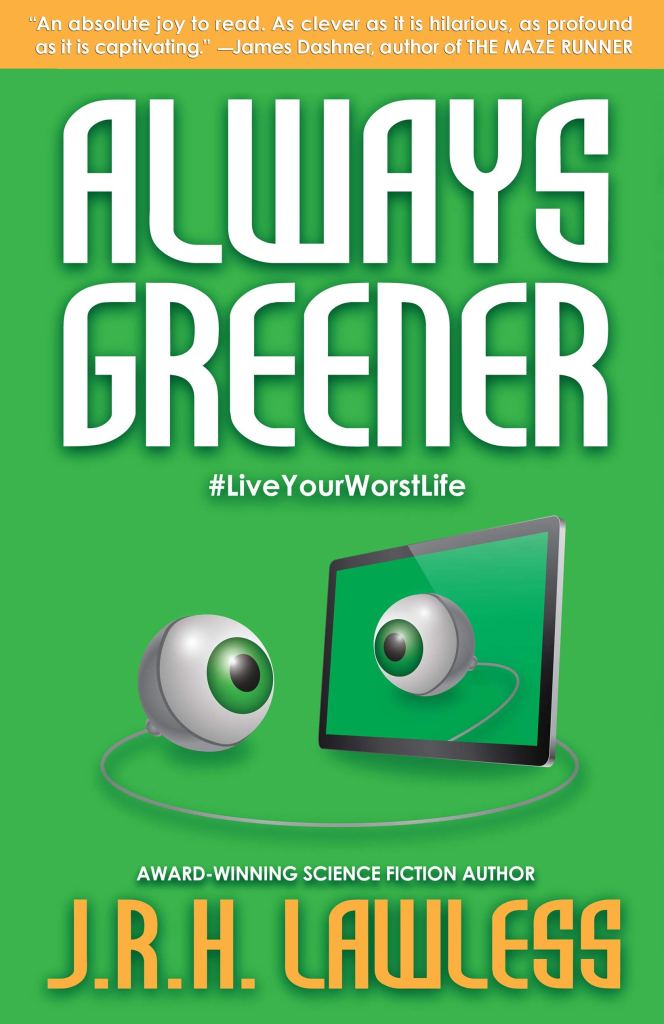Always Greener by JRH Lawless Review
Social commentary meets gratuitous reality TV in JRH Lawless’s new book Always Greener.

Always Greener by JRH Lawless features a cynical sci-fi world that pushes the limits of reality TV consumption and social satire. The book makes meta commentary on the real world outside the book while also showing the extremes that consumerism could reach in a plausible future.
It’s the groovy 70’s—the 2070’s, that is—and technology has advanced to the point where people have implanted special lenses in their eyes to access advanced Augmented Reality. This AR doesn’t feature flinging of balls at a Pokemon sprite hovering awkwardly in real space, this technology is so ingrained in the public sphere that people cease to think of it as separate from their lives. With this system, you can order a car with a jerk of your thumb, access files with a flick of the eye, or watch telecasts. This tech has become as second nature as driving and wearing clothes. Naturally, the next step is entertainment beamed directly into eyeballs. And after a more broadly-defined entertainment, comes reality shows.
Our protagonist Liam Argyle is the hapless host for the new AR show “Grass is Greener” in which contestants compete to prove who has the worst life. The broadcast is taken directly from their newly implanted AR lenses in their eyes—a more sophisticated version of what they already use that allows broadcast to billions of people who tune in worldwide. No moment is private as viewers tune in to each contestant’s point of view any hour of the day. It’s the latest reality show craze and the conditions are even crazier than the worst reality TV you can picture today.
The Red Corporation that runs the show is not necessarily doing things visibly bad to their contestants—for the most part, anyway. There is a situation in which a contestant refuses to share some private moments of their life and are punished for it. Other than that, the Corp’s major moral crime is observing these people in the first place, and not lifting a finger when the contestants’ lives turn from bad to worse.
To get a true picture, one must look at some of the contestants of GiG. There’s Usnavi, the immigrant who undergoes clinical trials to make money. Suicide Jill’s unfortunate profession is cleaning the scenes of suicides. Another great choice is Azar, a woman who is actually dying due to her antiquated AR lenses, and just desperately wants the new ones the show provides that are safer for her to use.
It would be wrong for this review to give away what happens to each of these contestants, but suffice to know there is a carefully tipped over balance of humor into shock. Liam discovers piece by piece that his new job is not as swanky as he first thought, as his ideas and concerns are cast aside by a frankly careless Editor who runs the show. Liam’s intentions are just, but he has to push against a Corporation which revels in the glory of sensationalism and human misery for the sake of viewership numbers.
Always Greener sits at the intersection of satire and criticism of the excesses of technology and reality-TV culture. If I were to compare Always Greener to any existing material, it would be a hodgepodge of Hitchhiker’s Guide to the Galaxy humor, George Orwell’s 1984 nihilism, and the tech and apathy of M. T. Anderson’s young adult novel Feed.
Always Greener is like Feed in that it depicts excessive technology owning the average person’s life. In Feed, everyone is fitted with an internal computer and ignores the world as it spirals into disrepair in pursuit of the next diversion. Always Greener shares a similar through line of cautionary tale. If power corrupts, then so does complacency.
The people of Always Greener are highly dependent on their AR tech, to the point where one character is shocked to see the world without the AR overlay, commenting, “You notice things that you would never have noticed otherwise. Simple things, but beautiful in their own way.” This comes not long after the same character claimed they’d prefer blindness to going without the AR lenses.
Lawless’ sparkling commentary comes through in all sorts of moments, making observations not just on the moment at hand but also on society in general. One great line was: “Misery loves company, and when company isn’t readily available, it will often settle for the next best thing, which is, of course, either reality television or pornography.”
Some of my favorite commentary was simply on character descriptions, such as “a bleached blonde woman with a chest so full of silicone it could have grouted an entire kitchen, with enough left over for a half bath.” A woman with the Red Corporation had a description that was no less colorful: “Her tones were as calm and collected as the growing shadow of a freefalling anvil.”
When you have such tantalizing descriptions of these, you’re eager to keep moving into the story, discovering new strange personalities along the way. The descriptions also lead to inside details—the silicone exposing the shallowness of the show, the exec woman’s tone as dangerous as a “freefalling anvil.” Foreshadowing is something we’re not too heavy or too light on. If there were a trio of bears about to enter the house, we might say this was just right.
There’s a heavy emphasis on socioeconomic differences making up a percentage of the contestants misfortune. Most of these people are financially deficient. Liam at first seems to kid himself thinking the show will provide opportunity, that showing their lives will help them in the long run. But even he falls victim to judging a book by its cover. At one point, he finds he needs to give a contestant a ride in his fancy new car. He questions himself, but still has hesitation when showing any sort of closeness to someone so far down the totem pole from himself.
The AR lenses also have a “Funfilter” an overlaid setting that can literally replace anything disagreeable or upsetting in view with something benign and cute. As you can imagine, Jill, the suicide-cleanup expert — makes use of this filter. It both hides the horror…and adds to it. This one feature is like an episode of Black Mirror. Contestant Juliette comments about AR editing the world around them and changing how people experience and interact with their world. “When that protective layer disappears suddenly—well, naked, unaugmented reality can be a pretty scary place.” The filter, and the AR itself, hide reality while also providing people with unlimited stimulation.
There are a number of annotations spread throughout. Many of them give definitions of particular words. Notably, the definitions are basically wrong in context, like when a contestant is stuck in a precarious position and couldn’t be removed — “to no avail” is marked for annotation, and the definition states “to have worth.” There is a commentary on etymology here, like when “consider” in another passage is defined as “to observe the stars.” The Latin origin of consider did mean exactly that.
Many annotations are made for pure comedic relief: “Liam didn’t know what to say, so he stuck to what he knew.7 [7 i.e.: nothing.]” Not all of these annotations hit the mark for this reader personally, but some of them were very funny. One could easily find themselves skipping over the annotations to continue with the flow of the story, then heading back to check an annotation after reaching the end of a paragraph.
This is an accessible read for the Kindle reader, to pick up and down as wanted, squeezing in a chapter or two easily between life’s ups and downs. At least this piece of fiction lets one set aside their own worries for a time, as Liam witnesses and experiences so many more. One can thank their good fortune that this is fiction, but the cautionary tale elements linger in the insanity of 24 hour feeds and zero privacy for strangers’ entertainment. It’s not that tall a tale if you figure how entertainment has changed around us in just a couple decades.
There’s also the beginnings of a future technology beyond the AR interface, which resonates with further complications for the human race. All in the sake of progress, right? Right?
It’s not all bleak—it can’t be, or the story would be a complete downer. There are some humorous moments, funny quips and turns of phrase Lawless does spectacularly well. The way he cleverly introduces a character, or adds new layers to an observation make a pleasant and mind tickling read. That being said, don’t expect sunshine and roses in Always Greener.
The ending—without giving anything away—does come naturally, like the ending of a TV season. It leaves some character development unfinished with a clear nod towards building more naturally in the sequel. This book will be followed up by The Rude Eye of Rebellion. You can read the first chapter at LawlessAuthor.com.
Always Greener is published by Uproar Books and is currently available on Kindle and paperback.

